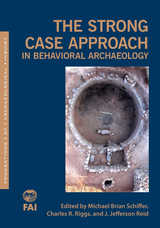
Behavioral archaeology is an emerging branch of anthropology emphasizing the study of relationships between human behavior and artifacts (material culture) in all times and places. As such, it aspires to make contributions beyond the confines of archaeology to other behavioral sciences and to society in general.
Behavioral Archaeology is a selection of writings by Michael Schiffer, one of the field’s primary proponents. The chapters include important works published between 1972 and 1987, the formative period of behavioral archaeology. Schiffer has crafted a lengthy introduction to the coume, a personal history that contextualizes the development of these works. Also new is the last chapter, which lists—and keys to the preceding chapters—the field’s most important principles, tenets, and premises.
Readers will discover that although behavioral archaeologist have put archaeological inference on a scientific footing and have fostered the growth of experimental archaeology and ethnoarchaeology as research strategies, behavioral archaeology is not confined to methodology.
Indeed, cultivation of the fields established here is leading to the development of new behavioral science focused on studies of people-artifact interactions. By closely juxtaposing method and theory, principles and applications, science and history, this book illustrates the coherence and scope of behavioral archaeology’s conceptual framework.

Behavioral archaeology, defined as the study of people-object interactions in all times and places, emerged in the 1970s, in large part because of the innovative work of Michael Schiffer and colleagues. This volume provides an overview of how behavioral archaeology has evolved and how it has affected the field of archaeology at large.
The contributors to this volume are Schiffer’s former students, from his first doctoral student to his most recent. This generational span has allowed for chapters that reflect Schiffer’s research from the 1970s to 2012. They are iconoclastic and creative and approach behavioral archaeology from varied perspectives, including archaeological inference and chronology, site formation processes, prehistoric cultures and migration, modern material culture variability, the study of technology, object agency, and art and cultural resources. Broader questions addressed include models of inference and definitions of behavior, study of technology and the causal performances of artifacts, and the implications of artifact causality in human communication and the flow of behavioral history.

The chapters employ a wide range of data classes, demonstrating the versatility and productivity of the approach for fashioning rigorous inferences in history, historical archaeology, ethnoarchaeology, and prehistory. By illustrating the strong case approach with convincing case studies from behavioral archaeology, the editors aim to alert the archaeological community about how the process of archaeological inference can be improved.
READERS
Browse our collection.
PUBLISHERS
See BiblioVault's publisher services.
STUDENT SERVICES
Files for college accessibility offices.
UChicago Accessibility Resources
home | accessibility | search | about | contact us
BiblioVault ® 2001 - 2025
The University of Chicago Press









